









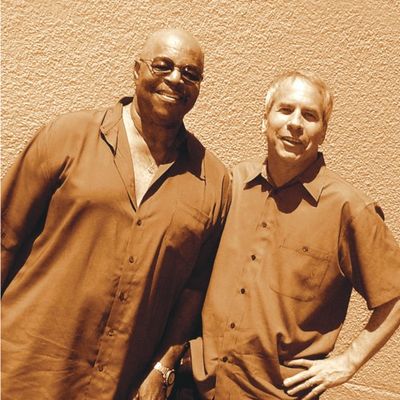
King Louie & Baby James
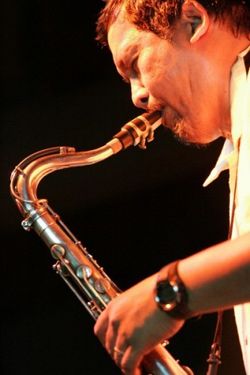
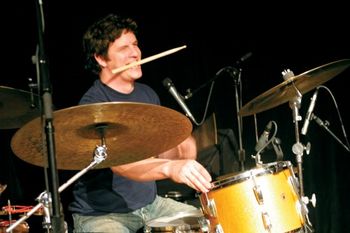
Renato Caranto Micah Kassell
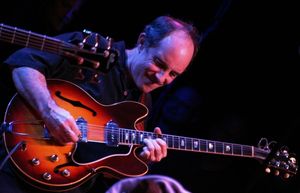
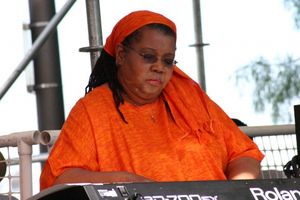
Peter Dammann Janice Scroggins (guest pianist)
 graffiti image by Edwin Coleman III
graffiti image by Edwin Coleman III
The late, great vocalist and entertainer, Sweet Baby James, was "Portland's Ray Charles." He was also dubbed, "A human landmark of Portland jazz," by Willamette Week. Almost immediately after Louis and James joined forces as King Louie & Baby James in 2005, there was a lot of buzz. The Oregonian's Marty Hughley called the band "stellar...top shelf...exemplary." And Cascade Blues Association president Greg Johnson wrote that KL & BJ's 2005 Waterfront Blues Festival performance "definitely falls in with the best of the festival's celebrated history. With the line-up making up this group, how can you possibly go wrong?"
That line-up started with Pain and Benton. As a key member of the Paul deLay Band and Mel Brown's popular B-3 Organ Group, Louis led the local revival of the Hammond organ sound. And James was one of the most soulful vocalists in the Northwest going back to Portland's legendary Williams Avenue scene in the '60s. Filling out this exciting band initially were NW standouts Renato Caranto on sax, Anthony Jones on drums, and guitarist Peter Dammann. Later, Micah Kassell became the drummer and, for a time, Eddie Martinez played guitar.
Sweet Baby James was not only a wonderful singer: he was an entertainer through and through. As a youngster, James played pro basketball with the Chicago Hottentots (a spinoff of the Harlem Globetrotters). As part of the act, James would wander to the side of the court during play and hammer away on a piano! His hoopster days behind him, James returned to Portland and ran a now-legendary 24/7 North Portland jam session/ barbecue known simply as "The Backyard." In those days, James was also in demand by the Hollywood set (John Wayne, Connie Stevens, et al), who frequently flew the group down to Lake Tahoe to perform at their private parties.
Until his 2016 passing, James demonstrated to a new generation how you combine musicality, soul, and charm. One of his later proteges was multi-Grammy winner Esperanza Spalding. The Portland Trailblazers took a special interest in the band as part of the team's community outreach program, sponsoring a series of events for North Portland seniors featuring the group.
Learn much more about the great, one-of-a-kind music and personality of Sweet Baby James Benton here!
----------------
Lynn Darroch poem: "Williams Ave 1953": The story of Sweet Baby James Benton and "The Backyard," where jazz musicians gathered in the 1950s, when Williams Avenue was the heart of the African-American entertainment district in Portland. With Louis Pain on organ.
---------------
UPDATE:
On October 9, 2021, James was posthumously inducted into the Oregon Music Hall of Fame. Fittingly, his favorite saxophonist, Renato Caranto,was inducted on the same evening--joining King Louie & Baby James' organist Louis Pain, inducted a few years earlier. Renato and Louis, with KL & BJ drummer Micah Kassell, performed at the induction event. They played James' favorite Renato-featured number, "You Are So Beautiful," in honor of their late bandmate: the heart & soul of King Louie & Baby James. James' stepson Bobby Fouther accepted the award on James' behalf and shared wonderful reminisces of James--including what it was like to live in a house that hosted 24/7 jam sessions in the garage!
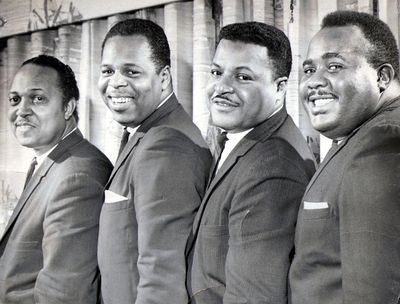
King Louie & Baby James wasn't Sweet Baby James' first band!
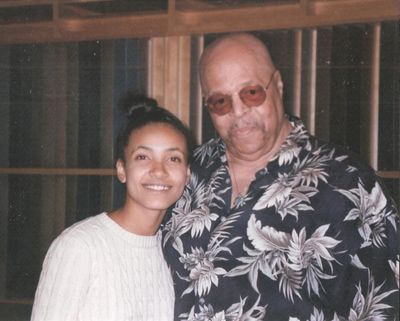
Sweet Baby with Esperanza Spalding, 2011 @ Kung Fu Bakery Studio
 Sweet Baby James tearing it up at the '05 Safeway Waterfront Blues Festival
Sweet Baby James tearing it up at the '05 Safeway Waterfront Blues Festival
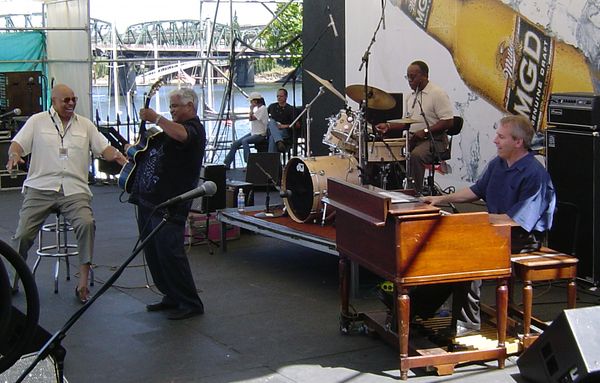
Guitar legend Phil Upchurch and James really hit it off (Mel Brown was on drums that day)


- - - - - - - - - - - - - - - - - - - - - - - - - - - - - - - - - - - - - - - - - - - - - - - - - - - -

Jenny Kane / The Oregonian
Sweet Baby James Benton is one of Portland's last links to its postwar days as a great jazz city, back when Portland's Albina district was filled with nightclubs and a thriving African American community.
The mellow tenor they call Sweet Baby James has just finished his first song, "It Had to Be You," before a packed audience at Jimmy Mak's when disaster hits.
Louis Pain detects something amiss with his Hammond organ and shuts down the five-piece band. He pulls out a blue plastic tool kit and plunges into the organ's mechanical innards.
Baby James is mortified.
He likes to start on time, establish a groove and keep his music flowing. An impatient patron leaving early would be a sign of personal failure.
Worse yet, unbeknown to the crowd, the show is being recorded for a new CD by the band called King Louie and Baby James. Every minute lost on stage means less music available for consideration.
Yet the audience sees none of James' inner turmoil. The Buddha-like figure taps a gentle rhythm on the red conga in front of him. He flashes his best smile and jokes about ex-wives. He waves to friends in the audience.
Pain snaps the tool kit shut. He's ready. The band glides effortlessly into "Mood Indigo."
Was the delay minutes or seconds? Whatever, it was too long to suit James. But James won't second-guess Pain's decision to fix a problem that not everyone could hear. "Louis is the best organist I've ever heard," the singer says later. "He's incredible. This is the best band I've been in."
The show goes on. Just as it has for nearly six decades for Sweet Baby James Benton.
People say Portland is a good music town. Rock bands blast your ears in clubs in nearly any neighborhood. Names such as Seafood Mama, Mel Brown, and Paul Revere and the Raiders bring knowing smiles. The story of "Louie Louie" almost ranks with the Boston-Portland coin flip in local lore.
But Portland's roots as a music town go deeper than most of today's fans realize. Urban changes and human mortality have slowly erased the memory of Portland as a great jazz city for a decade or more after World War II.
Sweet Baby James is one of the last reminders.
"He definitely was and still is one of the premier singers," says Robert Dietsche, a jazz devotee and historian who published "Jumptown, the Golden Years of Portland Jazz" in 2005. "He knew everyone. A lot of young musicians got their start with him."
 Courtesy of Sweet Baby James Benton
Courtesy of Sweet Baby James Benton
Sweet Baby James (third from left) joined Emmett Williams (from left), Eddie Fountaine and Big Dave English to form the Del-Tones in the 1960s.
The postwar musical boom was spawned by Portland's first large infusion of African Americans, lured to the region by Bonneville Dam construction and the Kaiser shipbuilding yards. Railroads were the primary means of transportation, and entire blocks of businesses sat on a street grid later erased by Interstate 5 and the Memorial Coliseum.
"Williams Avenue used to be like Northwest 23rd Avenue is today," Benton says. "Traffic ran in both directions. There were dozens of businesses. The sidewalks were full of people. Everybody dressed flashy. There was lots of food and lots of clubs."
Clubs such as The Frat Club, Savoy, Acme, McClendon's Rhythm Room, Paul's Paradise and the Olympic Room. The building that held the largest club, the Dude Ranch at 240 N. Weidler St., is the only one left after the freeway, Coliseum and an Emanuel Hospital urban renewal project obliterated Albina's business district starting in the late 1950s. The building is being remodeled for multiple uses, including a craft brewery.
Dietsche says the railroad was a key ingredient in Portland's musical prominence. National stars such as Count Basie, Duke Ellington and Louis Armstrong frequently played downtown ballrooms. Railroad porters could deliver the latest records from Chicago to jukeboxes at Ed Slaughter's popular pool hall on Williams Avenue faster than the records could reach stores.
"If you were touring on the West Coast, of course you stopped in Portland," Dietsche says. "There were a lot more clubs than there are now. Portland got a lot of action. Now they can fly right over."
Portland was racially segregated during the Williams Avenue glory years. Black patrons were not welcome at downtown venues, with the exception of McElroy's Ballroom — on the block now occupied by the Portland Building — where Cole McElroy promoted mixed dances complete with chaperones.
 Courtesy of Sweet Baby James Benton
Courtesy of Sweet Baby James Benton
Sweet Baby James (left) toured with Frank Martin (middle) and Delbert McSwain in the 1960s as the Frank Martin Trio.
Elsewhere, "you didn't chance it," Benton says. After numerous attempts dating to 1937, the Oregon Legislature finally passed a public-accommodations bill in 1953. But even during segregation, black clubs were open to whites who came to dance, listen and party. There were occasional fights, Benton says, but they were prompted by squabbles over women, not race. "People were allowed to be people," he says.
While not violent, the club milieu included figures who made their money from gambling, prostitution, drugs and hustling pool. "I could deal with the other side, too," Benton says.
Benton's father brought his family to Portland from Crossett, Ark., in 1940 after a brief stop to work on Hoover Dam near Las Vegas. James was 10. The family settled in Vanport's wartime housing but moved months before the devastating 1948 flood. James Benton graduated from Jefferson High School in 1949.
His first venture as an entertainer was as a basketball player. A Chicago promoter took Benton's Police Athletic League team on tour, hoping to catch the attention of Abe Saperstein, founder of the Harlem Globetrotters. Saperstein never called, but Benton found his tenor voice while singing and traveling with his teammates.
Back in Portland, Benton transformed his two-car garage on North Shaver Street into a veritable venue, with 39 theater chairs, a stage and two pianos. For the next few years, it became the scene of "hair-cuttin'" contests, in which musicians would try out new songs and compete for instrumental superiority.
"It really caught on," Benton says. "The musicians' grapevine was something else. Cats came from New York and L.A. We had a lot of heavyweight guys. There was always a big pot cooking in back with black-eyed peas and greens. And there was the barbecue."
Benton took a lesson from the garage, now long demolished. He'd stick with standards rather than write his own tunes. "Not everybody is a Gershwin," he says. "Lots of people think what they write will blow somebody's mind. They're not going to make a living doing that. They're probably living with their mothers or with ladies who collect musicians. Those ladies are out there, you know."
It was about 1960 when the "Sweet Baby James" nickname was bestowed on Benton, a decade before East Coast singer-songwriter James Taylor wrote a popular song of the same name. The Portland version came from a Williams Avenue denizen known as Sweet-Smelling Eddie. Eddie's pomade and cologne left an aroma wafting behind him for several feet.
Eddie nominated Benton to carry on the tradition. The name stuck. "Nobody knew what his real name was or where he lived," Benton says of Sweet Smelling Eddie. "You only saw him in the clubs. What happened to him? Nobody knows. You don't see characters like that anymore."
 Courtesy of Oregon Historical Society
Courtesy of Oregon Historical Society
The intersection of North Williams and Northeast Russell streets, shown here in 1962, lay at the heart of Portland's Albina district and hopping jazz scene. The district was destroyed by construction of Interstate 5 and the Memorial Coliseum and by a plan to expand Emanuel Hospital that ran out of money after land was cleared but before anything was built.
Benton spent much of the 1960s touring on a Pacific Northwest circuit, but earth-shaking changes were occurring both in music and on Williams Avenue. The meteoric success of Elvis Presley whittled interest in jazz and show tunes. The rapid spread of television changed entertainment habits.
Portland voters preferred an eastside location for the Coliseum, and the new I-5 wiped out the spine of the Williams Avenue club scene. The last of the old Albina business district, once "a city within a city," in Dietsche's words, was eliminated by plans for an Emanuel Hospital expansion that lost its funding after the land was cleared.
Wearying of the road ‐ "I couldn't stand the smell of a club for about seven years" — Benton spent nine years working in a Portland foundry and another 14 as a Teamster driving trucks.
In the late 1980s, he teamed up with two contemporaries from the Williams Avenue era, Cleve Williams and Bobby Bradford, and played often at Billy Reed's as the Original Cats. After the Cats broke up, Benton joined Pain and gradually added sax player Renato Caranto, drummer Micah Kassell and guitarist Peter Dammann.
"I'm playing with guys in their 30s, 40s and 50s," Benton says. "I'm old as dirt. It's fun being with them. When everyone's hitting, you get chills."
- - - - - - - - - - - -
Sweet Baby James Benton
Born: Crossett, Ark., 1930
Education: Jefferson High School, class of 1949
Current residence: Lives with his wife in Scappoose
Last CD: "King Louie & Baby James, Live at the Waterfront Blues Festival," 2005
Next CD: Due for release late 2008
Next appearance at Jimmy Mak's: 8 p.m. Nov. 7
Hear samples: www.myspace.com/ kinglouiebabyjames
- - - - - - - - - - - - -
While Benton's career is re-energized, so is Williams Avenue. The long run-down street is starting to pop with new eateries and shops. Blocks north of the old Albina district, Williams is beginning to take its place with Alberta Street and Mississippi Avenue in Portland's urban revival.And when City Hall started thinking about trying to add new life around the Rose Garden arena a few years ago, planning consultants suggested tearing down Memorial Coliseum and replacing it with the old street grid that would allow a new neighborhood to grow.
Removing the Coliseum gained no traction, but Ethan Seltzer, director of urban studies at Portland State University, thinks it's still a long-range option as deferred maintenance continues to mount at the 1960 arena.
"There is a real desire to find a better way to connect the east side with the neighborhoods around it and to the west side," he says. "There is a realization that the Coliseum is a barrier at this point."
While there's no guarantee a new neighborhood would recapture the feel of the old one, "my sense is that there is great interest in figuring out how to make that work," Seltzer says.
Back at Jimmy Mak's, in Northwest Portland, the second set by King Louie and Sweet Baby James goes down perfectly smooth. People eat and drink. A few dance. Some women strut in seductive summer party dresses.
Louis Pain and Renato Caranto trade rousing solos on the organ and saxophone. Sweet Baby does his signature version of "Georgia on My Mind." Listeners can close their eyes and hear Ray Charles.
"I've made my living singing 'Georgia' and other Ray Charles tunes," Benton says later. "I never met him. But every tune he ever recorded, I felt I knew where he was coming from."
The ovation is loud. Some people stand to cheer. Dressed in black with turquoise jewelry, Sweet Baby James makes his way through the audience, smiling and hugging and shaking hands.
Six decades later and on the wrong side of the river, maybe this is Williams Avenue.
-- Fred Leeson; portland@news.oregonian.com